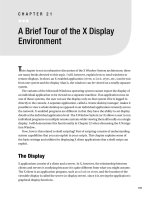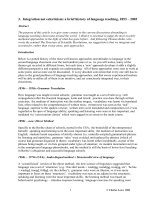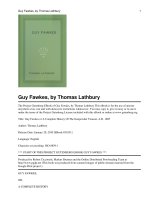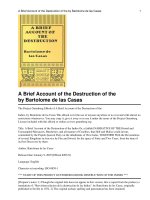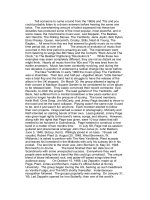A Brief History of the Internet docx
Bạn đang xem bản rút gọn của tài liệu. Xem và tải ngay bản đầy đủ của tài liệu tại đây (285.7 KB, 98 trang )
A Brief History of the Internet
by Michael S. Hart
March, 1995 [Etext #250]
Copyright 1995
******A Brief History of the Internet by Michael S.
Hart*******
*****This file should be named bhoti01.txt or
bhoti01.zip******
Updated EDITIONS of this etext get a new NUMBER, bhoti02.txt
The official release date of all Project Gutenberg Etexts is at
Midnight, Central Time, of the last day of the stated month. A
preliminary version may often be posted for suggestion, comment
and editing by those who wish to do so. To be sure you have an
up to date first edition [xxxxx10x.xxx] please check file sizes
in the first week of the next month. Since our ftp program has
a bug in it that scrambles the date [tried to fix and failed] a
look at the file size will have to do, but we will try to see a
new copy has at least one byte more or less.
Information about Project Gutenberg (one page)
We produce about two million dollars for each hour we work. The
fifty hours is one conservative estimate for how long it we take
to get any etext selected, entered, proofread, edited, copyright
searched and analyzed, the copyright letters written, etc. This
projected audience is one hundred million readers. If our value
per text is nominally estimated at one dollar, then we produce 2
million dollars per hour this year we, will have to do four text
files per month: thus upping our productivity from one million.
The Goal of Project Gutenberg is to Give Away One Trillion Etext
Files by the December 31, 2001. [10,000 x 100,000,000=Trillion]
This is ten thousand titles each to one hundred million readers,
which is 10% of the expected number of computer users by the end
of the year 2001.
We need your donations more than ever!
All donations should be made to "Project Gutenberg/IBC", and are
tax deductible to the extent allowable by law ("IBC" is Illinois
Benedictine College). (Subscriptions to our paper newsletter go
to IBC, too)
For these and other matters, please mail to:
Project Gutenberg
P. O. Box 2782
Champaign, IL 61825
Internet:
Bitnet: dircompg@uiucux1
CompuServe: >internet:dircompg@.ux1.cso.uiuc.edu
Attmail: internet!ux1.cso.uiuc.edu!dircompg
When all other email fails try our Michael S. Hart, Executive
Director:
(internet) hart@uiucvmd (bitnet)
We would prefer to send you this information by email
(Internet, Bitnet, Compuserve, ATTMAIL or MCImail).
******
If you have an FTP program (or emulator), please
FTP directly to the Project Gutenberg archives:
[Mac users, do NOT point and click. . .type]
ftp mrcnext.cso.uiuc.edu
login: anonymous
password: your@login
cd etext/etext90 though etext/etext95
or cd etext/articles
dir [to see files]
get or mget [to get files. . .set bin for zip files]
get INDEX?00.GUT
for a list of books
and
get NEW.GUT for general information
and
mget GUT* for newsletters.
**Information prepared by the Project Gutenberg legal advisor**
(Three Pages)
***START** SMALL PRINT! for COPYRIGHT PROTECTED ETEXTS ***
TITLE AND COPYRIGHT NOTICE:
Big Dummy's Guide To The Internet
(C)1993, 1994 by the Electronic Frontier Foundation [EFF]
This etext is distributed by Professor Michael S. Hart through
the Project Gutenberg Association at Illinois Benedictine College
(the "Project") under the Project's "Project Gutenberg" trademark
and with the permission of the etext's copyright owner.
LICENSE
You can (and are encouraged!) to copy and distribute this
Project Gutenberg-tm etext. Since, unlike many other of the
Project's etexts, it is copyright protected, and since the
materials and methods you use will effect the Project's
reputation,
your right to copy and distribute it is limited by the copyright
laws and by the conditions of this "Small Print!" statement.
[A] ALL COPIES: The Project permits you to distribute
copies of this etext electronically or on any machine readable
medium now known or hereafter discovered so long as you:
(1) Honor the refund and replacement provisions of this
"Small Print!" statement; and
(2) Pay a royalty to the Project of 20% of the net
profits you derive calculated using the method you already use
to calculate your applicable taxes. If you don't derive
profits, no royalty is due. Royalties are payable to "Project
Gutenberg Association / Illinois Benedictine College" within
the 60 days following each date you prepare (or were legally
required to prepare) your annual (or equivalent periodic) tax
return.
[B] EXACT AND MODIFIED COPIES: The copies you distribute
must either be exact copies of this etext, including this
Small Print statement, or can be in binary, compressed, mark-
up, or proprietary form (including any form resulting from
word processing or hypertext software), so long as *EITHER*:
(1) The etext, when displayed, is clearly readable, and
does *not* contain characters other than those intended by the
author of the work, although tilde (~), asterisk (*) and
underline (_) characters may be used to convey punctuation
intended by the author, and additional characters may be used
to indicate hypertext links; OR
(2) The etext is readily convertible by the reader at no
expense into plain ASCII, EBCDIC or equivalent form by the
program that displays the etext (as is the case, for instance,
with most word processors); OR
(3) You provide or agree to provide on request at no
additional cost, fee or expense, a copy of the etext in plain
ASCII.
LIMITED WARRANTY; DISCLAIMER OF DAMAGES
This etext may contain a "Defect" in the form of incomplete,
inaccurate or corrupt data, transcription errors, a copyright
or other infringement, a defective or damaged disk, computer
virus, or codes that damage or cannot be read by your
equipment. But for the "Right of Replacement or Refund"
described below, the Project (and any other party you may
receive this etext from as a PROJECT GUTENBERG-tm etext)
disclaims all liability to you for damages, costs and
expenses, including legal fees, and YOU HAVE NO REMEDIES FOR
NEGLIGENCE OR UNDER STRICT LIABILITY, OR FOR BREACH OF
WARRANTY OR CONTRACT, INCLUDING BUT NOT LIMITED TO
INDIRECT,
CONSEQUENTIAL, PUNITIVE OR INCIDENTAL DAMAGES, EVEN IF YOU
GIVE NOTICE OF THE POSSIBILITY OF SUCH DAMAGES.
If you discover a Defect in this etext within 90 days of
receiving it, you can receive a refund of the money (if any)
you paid for it by sending an explanatory note within that
time to the person you received it from. If you received it
on a physical medium, you must return it with your note, and
such person may choose to alternatively give you a replacement
copy. If you received it electronically, such person may
choose to alternatively give you a second opportunity to
receive it electronically.
THIS ETEXT IS OTHERWISE PROVIDED TO YOU "AS-IS". NO OTHER
WARRANTIES OF ANY KIND, EXPRESS OR IMPLIED, ARE MADE TO YOU
AS
TO THE ETEXT OR ANY MEDIUM IT MAY BE ON, INCLUDING BUT NOT
LIMITED TO WARRANTIES OF MERCHANTABILITY OR FITNESS FOR A
PARTICULAR PURPOSE. Some states do not allow disclaimers of
implied warranties or the exclusion or limitation of
consequential damages, so the above disclaimers and exclusions
may not apply to you, and you may have other legal rights.
INDEMNITY
You will indemnify and hold the Project, its directors,
officers, members and agents harmless from all liability, cost
and expense, including legal fees, that arise directly or
indirectly from any of the following that you do or cause:
[1] distribution of this etext, [2] alteration, modification,
or addition to the etext, or [3] any Defect.
WHAT IF YOU *WANT* TO SEND MONEY EVEN IF YOU DON'T HAVE TO?
Project Gutenberg is dedicated to increasing the number of
public domain and licensed works that can be freely distributed
in machine readable form. The Project gratefully accepts
contributions in money, time, scanning machines, OCR software,
public domain etexts, royalty free copyright licenses,
and whatever else you can think of. Money should be paid to
"Project Gutenberg Association / Illinois Benedictine College".
*SMALL PRINT! Ver.04.29.93 FOR COPYRIGHT PROTECTED ETEXTS*END*
A Brief History of the Internet
The Bright Side: The Dark Side
by Michael Hart with Max Fuller
(C)1995, Released on March 8th.
Chapter 00 Preface
The Internet Conquers Space, Time, and Mass Production
Michael Hart called it NeoMass Production [TM] in 1971
and published the U.S. Declaration of Independence on the
and no one was listening or were they?
???careful!!!!
If the governments, universities or colleges of the world
wanted people to be educated, they certainly could have a
copy of things like the Declaration of Independence where
everyone could get an electronic copy. After all, it has
been over 25 years since the Internet began as government
funded projects among our universities, and only 24 years
since the Declaration was posted, followed by the Bill of
Rights, Constitution, the Bible, Shakespeare, etc.
Why do more people get their electronic books from others
than these institutions when they spend a TRILLION DOLLAR
BUDGET EVERY YEAR pretending their goal is some universal
form of education.
This is the story of the Bright Side and Dark Side of
the Internet. . .Bright Side first.
The Facts:
The Internet is a primitive version of the "Star Trek
Communicator," the "Star Trek Transporter," and, also
a primitive version of the "Star Trek Replicator."
Communicator
The Internet "let's" you talk to anyone on the Earth,
as long as they, too, are on the Internet.
Transporter
The Internet "let's" you transport anything you would
be able to get into your computer to any Netter.
Replicator
The Internet "let's" you replicate anything anyone is
able to get into their computer, from "The Mona Lisa"
to "The Klein Bottle" if you use the right "printer,"
and the library never closes, the books are always on
the shelves, never checked out, lost, in for binding,
and there is never an overdue fine because you never,
ever, have to take them back.
The Bright Side and the Dark Side
For the first time in the entire history of the Earth, we
have the ability for EVERYONE to get copies of EVERYTHING
as long as it can be digitized and communicated to all of
the people on the Earth, via computers [and the devices a
person might need to make a PHYSICAL, rather than VIRTUAL
copy of whatever it might be. . .
Think about what you have just read for a moment, please,
EVERYTHING FOR EVERYONE. . .
as long as the Information Superhighway is not taken over
by the INFORMATION RICH and denied access to others other
than for a fee they may not be able to pay, and shouldn't
have to pay. . .since the INFORMATION RICH have had rides
for free for the first 25 years of the Internet.]
From 1969 to 1994, most of the traffic on the Information
Superhighway was generated by individuals who did not pay
tolls to get on the ramps to the Information Superhighway
. . .in fact, ALL of the early users were paid to get on,
except one. . .they were paid. . .BY YOU!
Michael Hart may have been the first person who got on as
a private individual, not paid by any of the 23 nodes, or
the Internet/ARPANet system, for his work; but who at the
time of this publication might have given away 25 billion
worth of Etexts in return for his free network access.
[i.e. Mr. Hart was the first "normal" person to have this
access to the Internet, a first non-computer-professional
for social responsibility; "We should provide information
to all persons, without delay. . .simply because WE CAN!"
Just like climbing Mount Everest or going into space, and
this is so much cheaper and less dangerous.
[For those of you considering asking that his accesses be
revoked, he has received permission from CCSO management,
previously CSO as indicated in his email address, for the
posting of this document and has also received permission
from several other colleges and/or universities, at which
he has computer accounts and/or is affiliated.]
In the beginning, all the messages on the Net were either
hardware or software crash messages, people looking for a
helping hand in keeping their mainframes up and running
and that was about it for the first 10-15 years of cyber-
space. . .cyber-space. . .mostly just space. . .there was
nothing really in it for anyone, but mainframe operators,
programmers, and a few computer consultants who worked in
multi-state regions because there weren't enough computer
installations in any single state, not even California or
Illinois, to keep a computer consultant in business.
The Bright Side
Mr. Hart had a vision in 1971 that the greatest purpose a
computer network would ever provide would be the storage,
transmission, and copying of the library of information a
whole planet of human beings would generate. These ideas
were remarkably ahead of their time, as attested to by an
Independent Plans of Study Degree in the subject of Human
Machine Interfaces from the University of Illinois, 1973.
This degree, and the publications of the first few Etexts
[Electronic Texts] on the Internet, began the process the
Internet now knows as Project Gutenberg, which has caught
fire and spread to all areas of the Internet, and spawned
several generations of "Information Providers," as we now
have come to call them.
It is hard to log in to the Internet without finding many
references to Project Gutenberg and Information Providers
these days, but you might be surprised just how much of a
plethora of information stored on the Internet is only on
line for LIMITED DISTRIBUTION even though the information
is actually in the PUBLIC DOMAIN and has been paid for in
money paid by your taxes, and by grants, which supposedly
are given for the betterments of the human race, not just
a favored few at the very top 1% of the INFORMATION RICH.
Many of you have seen the publicity announcements of such
grants in the news media, and an information professional
sees them all the time.
You may have seen grants totalling ONE BILLION DOLLARS to
create "Electronic Libraries;" what you haven't seen is a
single "Electronic Book" released into the Public Domain,
in any form for you to use, from any one of these.
The Dark Side
Why don't you see huge electronic libraries available for
download from the Internet?
Why are the most famous universities in the world working
on electronic libraries and you can't read the books?
If it costs $1,000 to create an electronic book through a
government or foundation grant, then $1,000,000,000 funds
for electronic libraries should easily create a 1,000,000
volume electronic library in no time at all.
After all, if someone paid YOU $1,000 to type, scan or to
otherwise get a public domain book onto the Internet, you
could do that in no time at all, and so could one million
other people, and they could probably do it in a week, if
they tried really hard, maybe in a month if they only did
it in their spare time. For $1,000 per book, I am sure a
few people would be turning out a book a week for as long
as it took to get all million books into electronic text.
There has been perhaps ONE BILLION DOLLARS granted for an
electronic library in a variety of places, manners, types
and all other diversities; IF THE COST IS ONE THOUSAND OF
THOSE DOLLARS TO CREATE A SINGLE ELECTRONIC BOOK, THEN WE
SHOULD HAVE ONE MILLION BOOKS ONLINE FOR EVERYONE TO USE.
HOW HAS THIS PROCESS BEEN STOPPED?
Anyone who wants to stop this process for a Public Domain
Library of information is probably suffering from several
of the Seven Deadly Sins:
Pride, covetousness, lust, anger, greed, envy, and sloth.
Merriam Webster Third International Unabridged Dictionary
[Above: Greed = Gluttony, and moved back one place]
[Below: my simple descriptions of the Seven Deadly Sins]
1. Pride: I have one and you don't.
2. Covetousness: Mine is worth more if you don't have a
copy or something similar. I want yours. I want the
one you have, even if I already have one or many.
3. Lust: I have to have it.
4. Anger: I will hurt you to insure that I have it, and
and to insure that you do not have one.
5. Envy: I hate that you have one.
6. Greed: There is no end to how much I want, or to how
little I want you to have in comparison.
7. Sloth: I am opposed to you moving up the ladder: it
means that I will have to move up the ladder, to keep
my position of lordship over you. If I have twice as
much as you do, and you gain a rung, that means I can
only regain my previous lordship by moving up two; it
is far easier to knock you back a rung, or to prevent
you from climbing at all.
Destruction is easier than construction.
This becomes even more obvious for the person who has
a goal of being 10 or 100 times further up the ladder
of success. . .given the old, and hopefully obsolete,
or soon to be obsolete, definitions of success.
"If I worked like a fiend all my life to insure I had
a thousand dollars for every dollar you had, and then
someone came along and wanted to give everyone $1000,
then I would be forced to work like a fiend again, to
get another million dollars to retain my position."
Think about it: someone spends a lifetime achieving,
creating, or otherwise investing their life, building
a talent, an idea, or a physical manifestation of the
life they have led. . .the destruction of this is far
easier than the construction. . .just as the building
of a house is much more difficult, requires training,
discipline, knowledge of the laws of physics to get a
temperature and light balance suitable for latitudes,
etc., etc., etc.
But nearly anyone can burn down a building, or a pile
of books without a fraction of this kind of training.
People are used to lording it over others by building
and writing certain items that reflect their lordship
over themselves, their environments, and, last/least,
over other people. If they were not engaged in power
over themselves [self-discipline, education, etc,] or
over their environments [food, clothing and shelter],
then they have only other people to have control over
and that is the problem. The don't want other people
to have it easier than they did. "If _I_ did it with
the hard ways and tools of the past, then _YOU_ would
threaten me if you use some easier ways and tools the
present has to offer, and _I_ don't want to learn the
new tools, since I have invested my whole life to the
mastery of the old tools." I have literally met very
highly placed souls in the system of higher education
who have told me they will quit the system on the day
they have to use email because it removes the control
they used to have over physical meetings, phone calls
and the paper mails. It is just too obvious if a big
wig is not answering your email, since email programs
can actually tell you the second it was delivered and
also the second the person "opened" it.
This is why SOME people fear the new Internet: other
people fear it NOT because they lose the kind of lord
position that comes with OWNERSHIP; rather they fear,
in a similar manner, they will lose the CONTROL which
they have used to achieve their position of lordship,
such as one kind of professor mentioned below.
*****As Hart's DOS prompt sometimes states:*****
"Money is how people with no talent keep score!"
"Control is how others with no money keep score!"
These Seven Deadly Sins, while named by various names and
by most civilizations, have nonetheless often been actual
laws; in that certain people were required, by law, to be
victims of the rest of their populations in that a person
might be legally denied ownership of any property, due to
racism or sexism, or denied the right to a contract, even
legally denied the ability to read and write, not just an
assortment of rights to vote, contract and own property
there have even been laws that forbade any but the "upper
crust" to wear certain types of clothing, a "statement of
fashion" of a slightly different order than we see today,
but with similar ends.
You might want to look up laws that once divided this and
other countries by making it illegal to teach any persons
of certain races or genders reading, writing, arithmetic,
and others of the ways human beings learn to have a power
over their environments.
Power over oneself is the first kind of power if you do
not control yourself, you will find difficulty in control
of anything.
Power over the environment is the second kind of power
if you do not control food, clothing and shelter, you are
going to have a hard time controlling anything else.
Power over other human being is the third kind of power
described above in the Seven Deadly Sins, a third raters'
kind of power. Those who cannot control anything else
must, by definition, have others control things for them.
If they don't want to depend on the voluntary cooperation
of others, then they must find some way to control them.
We are now seeing the efforts by those who couldn't BUILD
the Internet to control it, and the 40 million people who
are on it; people from the goverment to big business, who
feel "Freedom Is Slavery" or at least dangerous; and, who
feel the Internet is the "NEXT COMMERICAL FRONTIER" where
customers are all ready to be inundated with advertising,
more cheaply than with junkmail. Fortunately some of the
other Internet pioneers have developed ways of preventing
this sort of thing from happening BUT I am sure we aren't
far from lawsuits by the cash rich and informattion rich,
complaining that they can't get their junkemail into "my"
emailbox. We will probably all be forced to join into an
assortment of "protectives" in which we subscribe to such
"killbots" as are required to let in the mail we want and
keep out the junkemail.
These same sorts of protectives were forming a century or
so before the Internet, in a similar response to the hard
monopolistic pricing policies of the railroads which went
transcontinental just 100 years before this Internet did.
I suggest you look up Grange in your encyclopedias, where
one of them says:
"The National Grange is the popular name
of the Order of the Patrons of Husbandry,
the oldest general farm organization
in the United States. . .formed largely
through the efforts of Oliver Hudson Kelley,
a Minnesota farmer who was deeply affected
by the poverty and isolation of the farmers
he saw will inspecting farm areas in the South
for the U.S. Department of Agriculture in 1866.
In the 1870's the Grange was prominent in
the broader Granger movement, which campaigned
against extortionate charges by monopolistic
railroads and warehouses and helped bring
about laws regulating these charges. . . .
Although challenged, the constitutionality
of such laws was upheld by the U.S. Supreme Court
in Munn v. Illinois (1877).
[1994 Grolier Electronic Enyclcopedia]
***
The Internet Conquers Space, Time and Mass Production
The Internet is a primitive version of the "Star Trek
Communicator," the "Star Trek Transporter," and, also
a primitive version of the "Star Trek Replicator."
The Internet "let's" you talk to anyone on the Earth,
as long as they, too, are on the Internet.
The Internet "let's" you transport anything you would
be able to get into your computer to any Netter.
The Internet "let's" you replicate anything anyone is
able to get into their computer, from "The Mona Lisa"
to "The Klein Bottle" if you use the right "printer."
Don't forget the "SneakerNet" is part of the Internet
and let's you get information to or from those who do
not have direct Internet connections. SneakerNet was
a term developed to describe the concept of sending a
file to someone nearby the person you wanted, and the
person would then put on his/her sneakers and run the
disk down the street for you. From my experience, it
was incredibly obvious that SneakerNet traversed from
East to West and West to East around the world before
the Internet did, as I received letters from the East
and West as the Project Gutenberg Alice in Wonderland
Etext circled the globe long before the Internet did.
This is very important to know if you consider that a
possible future development might keep you from using
the Internet for this, due to socio-political motions
to turn the Internet into a "World Wide Mall" [WWM] a
term coined specifically to describe that moneymaking
philosophy that says "Even if it has been given away,
free of charge, to 90% of the users for 25 years, our
goal is to make sure we change it from an Information
Superhighway to an Information Supertollway.
I said "let's" you do the Star Trek Communicator, and
Transporter, and Replicator functions because it will
soon be obvious that those "Information Rich" who had
free access to the Internet for so long want to do an
Internet Monopoly thing to insure that what was free,
to the Information Rich, will no longer be free for a
class of the Information Poor.
This is serious business, and if you consider that it
would cost the 40 million Netters about $25 per month
to "subscribe" to the Information Rich version of the
Internet, that means one thousand million dollars per
month going into the hands of the Information Rich at
the expense of the Information Poor; we would shortly
be up to our virtual ears in a monopoly that would be
on the order of the one recently broken up in a major
anti-trust and anti-monopoly actions against the hand
of the telephone company.
Hopefully, if we see it coming we can prevent it now,
but it will take far more power than _I_ have.
People will tell you "No one can own the Internet!"
but the fact is that while you may own your computer,
you do not "Own the Internet" any more than owning my
own telephones or PBX exchanges means I own telephone
networks that belong to The Telephone Companies. The
corporations that own the physical wires and cabling,
they are the ones who own the Internet, and right now
that system is being sold to The Telephone Companies,
and your "rights" to the Information Superhighway are
being sold with them.
The goal of giving 10,000 books to everyone on Earth,
which we at Project Gutenberg have been trying to do,
virtually since the start of the Internet, is in huge
danger of becoming just another tool for those we are
becoming enslaved by on the Internet, and these books
might never get into the high schools: much less the
middle schools and grade schools because the Trillion
dollars we spend on educations with the rise and fall
of every Congress of the United States isn't meant to
educate, it is meant for something else. After all
if a Trillion dollars were really being spent on this
process of education every two years, should literacy
